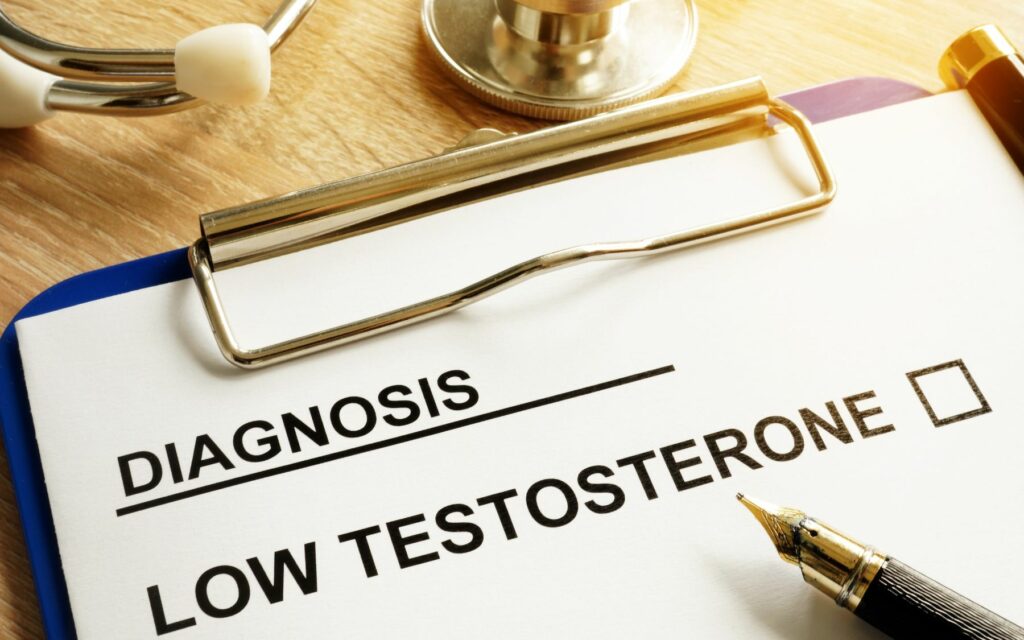
If a male has low testosterone, symptoms can include erectile dysfunction, reduced bone mass and sex drive.
The hormone has many important functions, including:
- the development of the bones and muscles
- the deepening of the voice, hair growth, and other factors related to appearance
- the production of sperm
Testosterone production can slow as a person ages, and many older people experience symptoms of low testosterone.
What are the symptoms of low testosterone?
Below are common signs and symptoms:
- Reduced muscle mass – Testosterone plays a role in the development of muscle mass, and reduced levels of the hormone can result in a significant loss of muscle mass. However, low levels causes a decrease in mass, the function and strength of the muscles do not diminish.
- Reduced bone mass – Testosterone helps to produce bone tissue and maintain bone volume. Low levels can lead to a reduction in this volume, which can make the bones more susceptible to fractures.
- Reduced sex drive – People with low levels often experience a reduction in sex drive. A diminishing sex drive occurs naturally with age, but when the cause is low testosterone, a male will notice a significant decrease in the desire for sex.
- A decrease in energy levels – Low testosterone can lead to reduced levels of energy and fatigue. A person may feel tired, even after adequate rest, or develop a diminished interest in exercise or movement.
- An increase in body fat – A reduction in testosterone can lead to an increase in body fat. In some cases, people with a deficiency of the hormone develop gynaecomastia, which causes an enlargement of the breasts.
- Hair loss – Many people experience hair loss as a natural part of ageing, and age-related hair loss can also affect anyone.
- Problems with erections – Low levels can make it difficult to achieve or maintain erections. However, low testosterone itself is not always a direct cause of erectile dysfunction. People with high levels can find it difficult to achieve erections, and people with low levels the opposite. Testosterone stimulates the penile tissues to produce nitric oxide, which starts several reactions that result in an erection. If levels of the hormone are too low, a man may not be able to get an erection.
- Reduction is testicle size – A male with low levels may notice a reduction in the size of their testicles that is not related to cold temperatures. The scrotum may also feel softer than usual.
- Reduction in the amount of semen – Semen is the fluid that makes up the majority of male ejaculate. This type of fluid helps the sperm move toward the egg. Testosterone helps stimulate the production of semen, and reduced semen levels can indicate a reduction in testosterone. It can also lead to fertility issues.
- Difficulty sleeping – People with low testosterone may find it difficult to fall or stay asleep. Low levels are common in men who have sleep apnea. This potentially severe disorder causes a person to temporarily stop breathing, which can disrupt sleep.
- Changes in mood or mood swings – Some evidence suggests that people with low levels are likely to experience a lack of focus, irritability, and depression.
Low testosterone does not always present symptoms, and some people only learn about it after a routine physical examination with blood work.
How can we help those who suffer from low testosterone?
The most common treatment is testosterone replacement therapy (TRT).
A doctor will typically only prescribe TRT if the person has several symptoms of low testosterone and blood test results that indicate a deficiency.
There are several delivery methods of TRT, including:
- skin patches
- gels
- tablets that dissolve in the mouth
- injections
- surgically implanted pellets that release the hormone
Most people will notice relief from symptoms within 4–6 weeks of starting TRT.
However, anyone who experiences one or more of the above symptoms should seek medical attention.
To diagnose low testosterone, your doctor will often perform a physical evaluation and review your symptoms. Your doctor may also request testing to look for additional signs.
If you wish to see our specialists for low testosterone, please contact us to organise a consultation. You can also find out more here.



